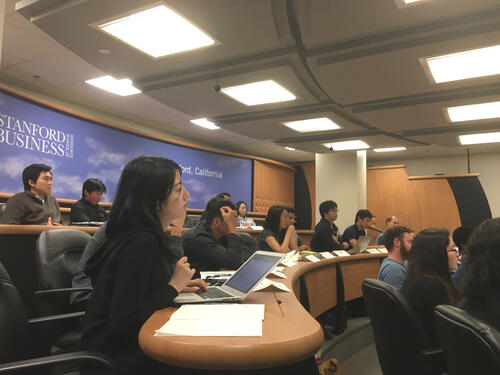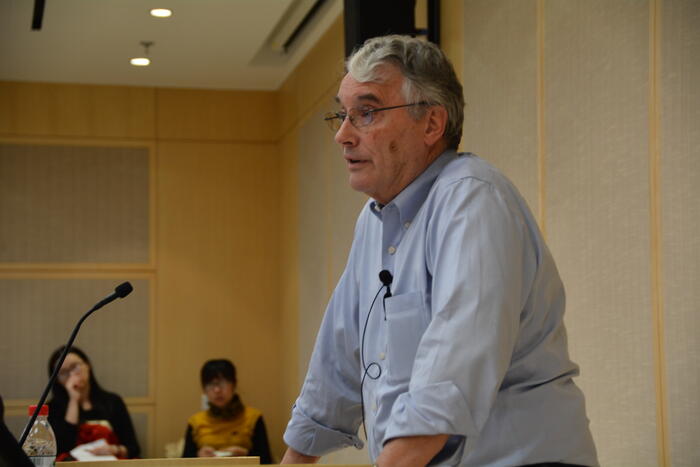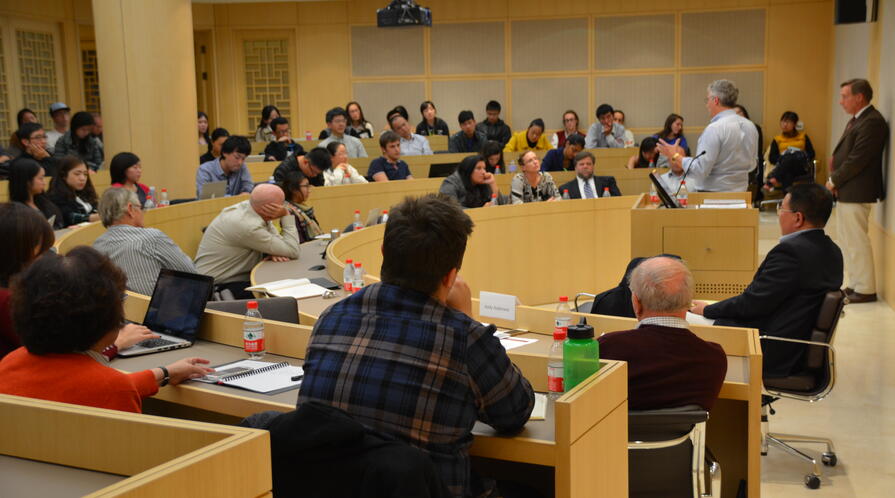Mike McFaul's public talk at SCPKU July 6, 2015
FSI Director and SCPKU Mingde Distinguished Faculty Fellow Mike McFaul shares with SCPKU intern Nathalie Chun key insights during his month-long academic residence at the Stanford Center at Peking University (SCPKU) this summer.
What is the purpose of your current visit? Could you tell us about your experiences and findings?
Michael McFaul: My main intellectual interest was to understand more about Chinese foreign policy and in particular the bilateral relationship between China and the US but also the bilateral relationship between China and Russia. I’m thinking of writing something, a new project, about this trilateral relationship. And so I spent the most of my time over the last several weeks speaking to two sets of people that are very different: those that focus on United States and those that focus on Russia. In addition, I have an interest in the politics of economic reform and the politics of political reform so I’ve also been speaking to academics, business people, and a few journalists to talk about the change that is going on here in China both on the political and economic dimensions
Is there in particular that you’ve learned about here in China that has surprised you? You’ve mentioned that you’ve talked to many different people so I was wondering if there was anything in particular that made you go ‘Oh that’s really interesting!’
MM: That’s good question. In terms of my subject matter, the thing that was most interesting to me as a concept of dual rising powers. So, the conventional wisdom is that China is rising and the rest are fading. But one academic, and it actually came up more than once, reformulated that idea. It’s not that China is rising and everybody else is fading, it’s actually that the United States is rising with China, just at a slower pace. And so maybe eventually they catch up, but it’d be incorrect to say that one is declining and that one is rising, and vis-á-vis the rest of the countries in the world. I also think that’s a better formulation because actually the United States continues to grow at a higher rate. It still has the largest military in the world; in terms of soft power [it still] has great reach and that has not been declining, that’s still rising. It’s just that when we look at this rate of change relative to the rate of change in China, the United States feels like it’s falling behind. Or China is catching up is a better way to put it. I thought that was interesting.
Second interesting point is, you know I just spent two years as Ambassador to Russia from the United States, and there I would say there is a feeling of… envy towards the United States. Like we have wronged them or that we are guilty for some of the difficult periods that they have had, kind of like a chip on their shoulder. Here I don’t feel that. Here I see a kind of self-confidence that people have, wanting to work with United States. Most certainly when I met with officials there was a very strong sense of wanting to have cooperative relations with the United States and in particular it jumped out at me when I was at the Ministry of Foreign affairs yesterday, they kept using the phrase ‘win-win outcomes’ for China and the United States. Well that’s exactly what we’re trying to do with Russia when I was in the government; during the early period of the Obama administration we used that phrase too. And I find it interesting that here the bilateral relationship with China, the Chinese still talk about that, and most certainly do the Americans too. I met with Ambassador Baucus and his team, and they most certainly talk that way. I find it kind of tragic that in the bilateral relationship with Russia, we no longer talk that way.
You’ve just mentioned the whole idea of zero-sum perspective of looking at the world and I guess in IR theory that would be a more realist perspective, as opposed to a liberalist perspective. So do you think that this sort of liberalist perspective should the future of looking at and that this ‘win-win’ perspective is one that future diplomats should hold?
MM: I worked on the Obama campaign in 2008 and one time on a flight with him when I was briefing him, I started to talk about these two camps, realist and liberal camps, as a way to understand foreign policy and you know how he responded to me? He said “Come on, the real world, requires you to use both of those theories depending on the issue and the country and the bilateral relationship” and when I was in the government, I most certainly felt that way. These are useful paradigms to kind of clarify arguments but I wouldn’t want to be labeled in one camp or the other and I think it’s analytically distorting, not revealing, to say the world is either realist or liberal. That said, I lean towards liberalism personally. I do believe in the 21st Century, maybe not early centuries it was possible, but in the 21st Century it is possible to construct outcomes that are good for both countries especially through the use of treaties and institutions. And I come away from my month here in China feeling that there are real challenges in the bilateral relationship, complicated issues, but they’re not irreconcilable issues. Even South China sea right, even Taiwan, I see the possibility, with smart diplomacy, that we can find ways to manage these issues so that it doesn’t lead to conflict between the United States and China
While you were here at SCPKU you have given talks on both the upcoming US elections and current US-Russia relations. Putting those two themes together, what do you think are the implications of the current US-Russia relations on the upcoming elections in 2016 and the way the next president will tackle these issues?
MM: I would say, I predict continuity, more or less. That is to say, that the policy that you see now was a reaction to Russia annexation of Ukraine, of Crimea, and intervention in Eastern Ukraine, is one of deterrence and punishment. There are three dimensions to it: sanctions to punish Putin’s bad behavior, strengthening of NATO to deter him from going further and third, shoring up Ukraine to try and make the economy there recover from this very difficult period. And I basically think those three main policy trajectories will continue, I don’t see a change. But in each one of them, you might see more or less the same paths. I predict that if a Republican candidate is elected, the ones who’s policies I know, or even Secretary Clinton, you would see for instance maybe military assistance to Ukraine, which is something the Obama administration has so far been reluctant to do, but I don’t foresee major change. And that disappoints people here in China. When I say that they are disappointed, it is because they are hopeful after an election there might be a new president that may try to reset relations with Russia again. I’m not optimistic.
What roles, in your opinion, is SCPKU playing in China, and what do you hope the Center will achieve in the future?
MM: Well what I hope the Center will achieve for the future is to create greater connectivity between hundreds of Stanford scholars working in all fields. This is an incredible place, I’ve never seen it before until this trip, absolutely beautiful, 21st century technology, and the second thing is, Peking University is an incredible university, beautiful campus, really all of my interactions with scholars here have been very positive, they’ve been very warm in greeting me as a fellow scholar and I’ve been impressed by the students as well. So that is my hope, over the coming years and decades, that this serves as a bridge between PKU, but also all of China, and Stanford University because there are many difference issues in all different fields of study where there’s room to cooperate. In my field, I also see a very concrete role to help develop what we call Track II dialogues, with China scholars, in terms of helping to manage US-China bilateral relationships. It’s very clear to me there’s a close relationship between senior scholars here at PKU and the government and the Party and the business community and the People’s Congress. I’ve met many people and they know all the people here and we have those connections in terms of Washington as well at Stanford. So my hope is that in a concrete way, and for me personally, that I might be involved in that, and we have an incredible platform here to be able to do so.









 Thomas Fingar speaks at SCPKU October 27, 2014, as part of the International Diplomacy Lecture Series.
Thomas Fingar speaks at SCPKU October 27, 2014, as part of the International Diplomacy Lecture Series.
